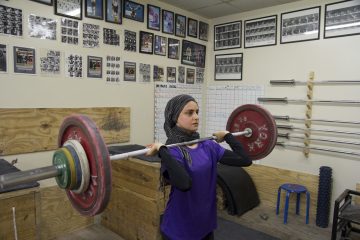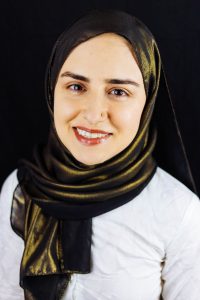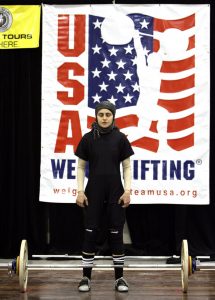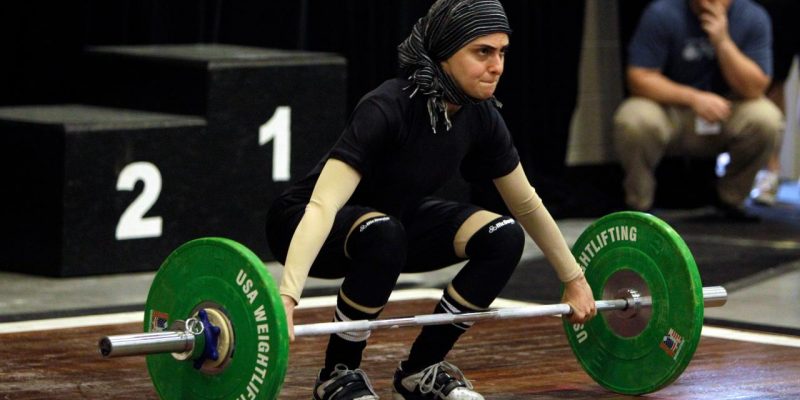For decades, weightlifting has been a sport dominated by men since first becoming competitive in 1891 but it took almost 100 years before women could compete in the sport.
Then in 2000, female weightlifting finally made its debut at the Sydney Olympics. Since then, the world of weightlifting has expanded to many countries around the world. But in some countries women are still underrepresented in the sport particularly among Asian and Muslim communities.
Kulsoom’s story
Kulsoom Abdullah, an American-Pakistani weightlifter, was the first woman to represent Pakistan in the 2011 World Weightlifting Championship. She made history there by being the first to compete with a headscarf.
Kulsoom first started her interest in sports at a later age saying she never thought about participating from a young age due to a lack of role models and facilities. It was at Graduate school when she first became interested in becoming an athlete.

“I had met a lady from Germany who I went to the same graduate school with and she was taking a Taekwondo class and encouraged me to do that class with her. She had talked to the instructor about my clothing choices and he was fine with that, he didn’t really care if I was wearing a headscarf or not or it wasn’t a big deal.
“I liked it, it was a good stress relief. It was only after I finished school that I started thinking about weightlifting. I thought it would be an interesting challenge because it has these different elements of timing and speed.
“I found this CrossFit gym and there were these Olympic weightlifting coaches who taught me how to lift and they kept trying to convince me to compete locally. Finally after two years I agreed and went to my first competition.”

Kulsoom explained that at competitions she wears her regular sportswear which is a long sleeve shirt with trousers and the headscarf. This had caused no issues at local competitions. It was only when she reached the qualification for being able to compete in the USA National Championships where the issues with clothing began.
“At the national competitions everyone wears what’s called a singlet. It’s a skin tight suit and has to be cut off above the knees and elbows. The singlet obviously doesn’t have a headscarf and the sleeves that I wear. They (USA Weightlifting) said that this was the first time anyone had ever asked to be accommodated for so to speak at a national level.”
In weightlifting, athletes wear a singlets to expose their knees and elbows. This is so the referees can see the competitor is not bending elbows, standing straight and to also make sure that no gear is worn that could unfairly improve an athletes performance.
Kulsoom had put in requests to change the clothing rule that allowed her to wear her religious dressing however USA Weightlifting denied her request as they are a private company and said she would have to take the issue to the International Weightlifting Federation (IWF). Kulsoom’s challenge received national and international media attention which led her to make a press conference with help from the Council of American-Islam Relations that led to the IWF reviewing her case.

“You know it was very daunting being the first person to do this. I was hoping it wasn’t going to be a big deal and that they would accommodate but then it ended up becoming a big deal with major news corporations covering my story.”
She made her argument to the IWF stating how her clothing choices would not affect the referees decision to make clear calls in a presentation to the IWF. Eventually, they agreed to allow Kulsoom to wear her headscarf and long sleeved clothing in international and national competitions.
“You know it was very daunting being the first person to do this. I was hoping it wasn’t going to be a big deal and that they would accommodate but then it ended up becoming a big deal.”
Kulsoom’s victory changed the history of weightlifting forever – the IWF changed the rules which now opens up a huge window of opportunity for other female Muslim athletes wanting to try weightlifting.
Here is a video of Kulsoom at the 2011 Weightlifting Nationals:
When asked about the sports industry, she is adamant things need to change. “I think it needs to change. I’m seeing progress like Nike bringing out a headscarf, but there’s still a need for more brands to make a hijab with breathable material so that more people can play in sport.”
Clothing is a big barrier that excludes Muslim women from participating in sports due to the limited of sportswear available.
Emerging sportswear companies
Jog On is a small clothing brand that specializes in making sportswear appropriate for Muslim women. A local company based in Essex, Jog On has a range of sports hijabs available for worldwide shipping.
“It all started with my personal page on Instagram when I would just post my running journey and then more people started engaging in it,” said Lynne Northcott founder and director of Jog on. “I always struggled to find the best performance fabric that covered me where I wanted to be covered and there was nothing on the high street that I could find to make me feel comfortable.”
“When a sports hijab came out I was so excited. But when I tried it on, I was disappointed because it just didn’t look right on me. It was just an issue of confidence, I wanted to fit in and not look weird and different.”
This gave Lynne the idea to make her own sports hijab.
“I was waiting and waiting for something, someone else to make another hijab. I thought why am I waiting? Why don’t I just get on with it and do it myself.”
Since launching in August 2019, Jog On has won the 2020 Small Business of the Year award from the British Muslim Awards and continues to grow it’s platform on Instagram.
“I had a pop up shop at the HSBC bank in Stratford and I was surprised by how many Muslim women who aren’t on social media didn’t even know that there was such a thing as a sports hijab. One lady said the only reason she doesn’t go to the gym was because she didn’t have the right clothes.
As soon as she saw my pop up, she said her life was about to change. That makes me really proud to realise that, just having this product out there is life changing for so many women.”
Have a look at Jog On’s collection here.
For more on the Muslim women in sports project:


 Listen to Today’s Round Up of the Climate Action Podcast
Listen to Today’s Round Up of the Climate Action Podcast